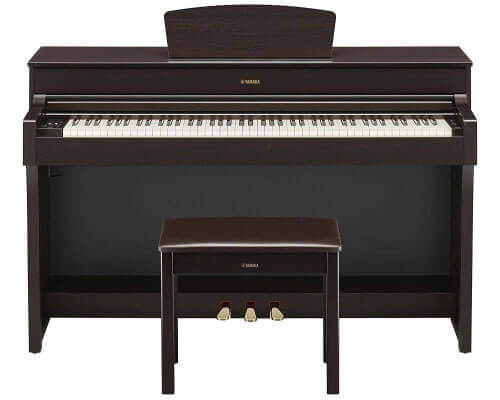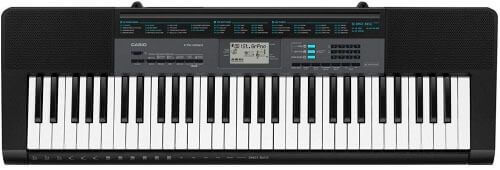Often, I have met myself amidst people arguing about the differences between the digital piano, the keyboard and the synthesizer.
If there is anything I leave such places with, it is the fact that people do not actually have enough understanding of these instruments – or machines, as it were.
Considering the fact that little is really known about this topic, I decided to write about it, shedding more light on these different instruments, their peculiarities and their purposes.
My objective for writing this, however, is to provide information that may guide you when you decide to get an instrument.
Hence, you will know what you need and what you are meant to go for.
To proceed, we need to do a bit of explaining, on what these three instruments are:
Digital Piano
A digital piano is designed to serve as an alternative to the acoustic piano. It almost completely inculcates the attributes of an acoustic piano. Often, it is constructed to look like an upright piano or a grand piano.

A digital piano, in most cases, does not have the luxury of being able to produce any other sound, asides from the actual acoustic piano sound – or something close to it, which is then amplified by internal speakers.

The produced piano sound, which may be synthesized sounds or actual piano samples, can be connected to an amplifier, if it has to be used in a bigger environment.
Like the acoustic pianos, most top digital pianos come with weighted keys, to give you the all-round feel of playing an acoustic keyboard.
Keyboard
As much as the term, keyboard, can be a generic term to refer to the digital piano and synthesizer; in this case, it is talking about a smaller, more compact and digital keyboard instrument that uses electricity – like the digital keyboard and the synthesizer; however, it has an advantage of being able to recreate a wide variety of instrument sounds.

The keyboard does not really have the luxury of being able to synthesize its own sound. Instead, out of the preset sounds that have been installed on the instrument by the manufacturer, the user is allowed to select the sound he prefers for whatsoever purpose he desires.
The keys of these keyboards are often unweighted.
Unlike the digital piano which is built to have a structural semblance with the acoustic piano, the keyboard is totally different.
It is built to be lighter than the digital keyboard, therefore it can be easily carried, from one place to another, without occupying so much space or consuming so much man power.
Synthesizer
This is an electronic keyboard instrument that generates audio signals and converts it to sounds.
The synthesizer simply generates sounds that are not conventional or usual, sets it into scale, such that the sound can be musically applied.

Therefore, the synthesizer provides a wide range of sounds; in fact, they can imitate different sounds: human voice; natural sounds like that of the ocean wave; and electronic sounds like those heard in Electronic Dance Music.
In music application, synthesizers generate sounds by distorting the audio signals.
Distorting audio signals, provide you with an endless variety of sounds that the synthesizer can produce, at the turning of a knob.
How to Choose Between These Options?
Now that we understand what these three instruments are, and what they do; let us check out the points to consider before you decided to get either of these three:
The Length of the Instrument
This is not literally talking about the length of the instrument; however, it may be part of it. The larger the number of octaves on the instrument, the longer the instrument.
When it comes to procuring any of these three, you need to consider if you need an instrument with a wide note range.
For instance, a classical student may need an instrument with, at least, seven octaves because they would have different phrases that may demand a particular pitch that only a piano with seven octaves can give.
For such a student, a digital piano would do just fine. You can check our collection of digital piano reviews to find the right one for your budget and needs.
However for a learner, or for someone who is into another genre of music that does not necessarily need seven octaves for musical expression, an electronic keyboard would do just fine.
Weighted Keys
If you are a classical player, you should naturally desire a keyboard instrument with weighted keys.
The reason is because, the acoustic piano has hammers in it that hit the strings when a note is pressed. This explains why the keys of the acoustic piano are heavy.
Therefore, if you need to get a keyboard instrument that is cheaper than the acoustic piano but best prepares you for the acoustic piano experience, then a high-quality digital piano with weighted keys is your best bet.
Also, the digital piano provides you with an advantage of having a wide range of notes.
Most electronic keyboards, with five octaves, do not have weighted keys. Therefore, for a person who does not really fancy the extra weight, just go for the electronic keyboard – especially if your type of music does not demand it.
Preference, Purpose and Purse
It is important to consider the purpose of any of these instruments before you buy it.
Imagine, if you are a classical student, from the examples above, I have proven to you that a good digital piano is your best bet.
However, if you are a producer who produces Electronic Dance Music, you may naturally gravitate towards a synthesizer because it gives you the luxury of being able to distort sound.
This means you can decide to add some reverberation, resonance or compressor on that sound and you can do so in real time.
Also, the place where the instrument is going to be used is also an important point that should be put in consideration.
Take for example, a church that loves the natural piano sound but does not have the financial resource to purchase an acoustic piano, such a church can go for a digital piano.
But when it comes to use in the studio, an electronic keyboard that can be used as midi with a computer or a synthesizer will do perfectly.
In conclusion, I hope the little that I have shared with you may help you, when you come to a point of choosing the instrument to purchase among these three.
Therefore, get the instrument you want and get on with making good music.